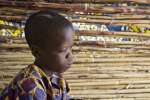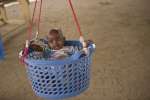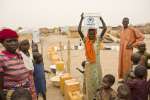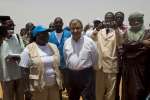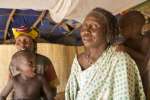- Text size
 |
|  |
|  |
| 
- Français
UNHCR's Guterres and new Assistant High Commissioner urge more international attention for Africa's forgotten trouble spots
News Stories, 6 March 2006

GENEVA, March 6 (UNHCR) – Returning from a one-week mission to the Great Lakes, High Commissioner for Refugees António Guterres called on the international community Monday to increase its support to the African region at a crucial time in its troubled history.
"The first impression is one of hope," he said during a news conference in Geneva, where he was joined by UNHCR's new Assistant High Commissioner Judy Cheng-Hopkins, who had just returned from a separate mission to Chad. "The resilience of the people is making possible what everywhere else would be a miracle. My appeal to the international community is to provide the conditions for these hopes to be translated into reality. That will require a bigger engagement in the years and months to come."
The High Commissioner last week visited the Democratic Republic of the Congo (DRC), Rwanda, Burundi and Tanzania. In the first three countries, he was on an unprecedented mission with the heads of the two other largest UN humanitarian agencies, James Morris of the World Food Programme (WFP) and Ann Veneman of the children's fund, UNICEF.
The delegation's first stop was in the Democratic Republic of the Congo, where, the High Commissioner said, massive human rights violations are still taking place in some of the eastern provinces due to the extremely precarious political situation.
"According to the lowest of the figures I received, and there are much higher estimates," he said, "the number of rapes in 2005 in the eastern parts of the Democratic Republic of the Congo was 25,000. This is something intolerable in today's world."
The High Commissioner stressed the importance of supporting the efforts of the Congolese government in building a well-trained and disciplined national army in order to improve the country's human rights situation.
"At the moment," he said, "the armed forces are an important factor of insecurity: not only do they not guarantee security, they actually commit human rights violations themselves. The international community has to do more to help the governments train and discipline its army – and for this, the government needs salaries to pay its soldiers and food to feed them."
Guterres also highlighted the need for a coordinated approach in finding solutions for the region, which shelters hundreds of thousands of refugees and has been the recent theatre of some of the worst violence and atrocities the world has seen since World War II. In the DRC alone, an estimated 4 million people have died.
The High Commissioner said a global approach was needed not only on the political level, but also in the humanitarian field, noting this first joint mission was a clear signal of the UN's commitment to team-work. He used the example of the drought that is currently affecting eastern and central Africa to explain why a coordinated approach between humanitarian agencies is crucial.
"Many of the displacement problems we have today, and I am talking of tens of thousands of people, are not to do with persecution or conflict but with hunger," he said, adding that UNHCR and WFP will need to work together even more closely on this issue. "We have to address food security to avoid displacement. People should not have to leave their country to be able to receive assistance, but often it is easier for Burundians to find food in a refugee camp in Tanzania than in their village in Burundi."
UNHCR's new Assistant High Commissioner for Operations, Judy Cheng-Hopkins, also spoke at Monday's news conference. Cheng-Hopkins was just back from a six-day trip to Chad, her first mission since taking office in mid-February. UNHCR runs 12 camps for more than 200,000 refugees from the Darfur region of Sudan in eastern Chad.
After more than three years of violence and persecution, the flight of Sudanese from Darfur continues, with more than 100 Sudanese a day arriving at Gaga camp in eastern Chad.
This massive influx of refugees into eastern Chad, one of the world's most arid and poorest regions, is very problematic for the host country, Cheng-Hopkins said.
"We have to recognise that the refugees' presence is causing environmental damage," she said. "Lack of water, lack of firewood – we are really talking basic necessities – are causing tensions with the local population. We have to focus on projects to help the host communities as well as refugees."
The Assistant High Commissioner also expressed concern at a worrying trend developing in the south of Chad, where thousands of refugees have arrived from the neighbouring Central African Republic (CAR) in recent months.
"We really cannot afford in a country as fragile as Chad to have two areas of insecurity, one in the east and one in the south, with all sorts of movements across the borders," she said, calling the situation in CAR one of the world's forgotten emergencies.
Since the middle of last year, thousands of people have fled growing insecurity in northern CAR caused by a mixture of armed insurgency against the Bangui government, military reprisals against northern villages where the insurgents are thought to be hiding, and widespread banditry.
"At the moment, there are some 47,000 refugees from CAR in southern Chad," she said. "The international community has to act now rather than let the south and CAR degenerate to the point where we have another Darfur. We really cannot afford that."













